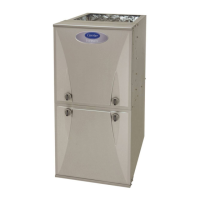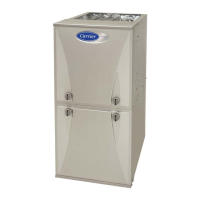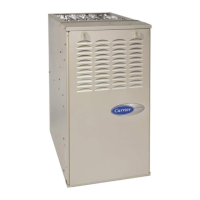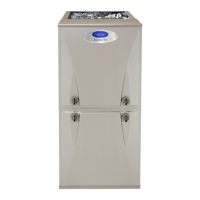PG92MSA: Installation, Start-up, Operating and Service and Maintenance Instructions
Manufacturer reserves the right to change, at any time, specifications and designs without notice and without obligations.
56
Heating value = 1050 Btu/cu ft.
Specific gravity = 0.62
Therefore: Orifice No. 44
Manifold pressure: 3.4-in. w.c. (847 Pa)
(Furnace is shipped with No. 44 orifices. In this example, all main
burner orifices are the correct size and do not need to be changed to
obtain proper input rate.)
NOTE: To convert gas manifold Table pressures to Pascals, multiply the
in. w.c. value by 249.1 Pa/in. w.c. (1 in. w.c. = 249.1 Pa).
Check Inlet Gas Pressure
The inlet gas pressure must be checked with the furnace operating in
maximum heat. This is necessary to make sure the inlet gas pressure
does not fall below the minimum pressure of 4.5 in. w.c.
1. Make sure the gas supply is turned off to the furnace and at the
electric switch on the gas valve.
2. Loosen set screw on inlet tower pressure tap no more than one full
turn with a 3/32-in. hex wrench or remove the 1/8-in. NPT plug
from the inlet pressure tap on the gas valve.
3. Connect a manometer to the inlet pressure tap on gas valve.
4. Turn on furnace power supply.
5. Turn gas supply manual shutoff valve to ON position.
6. Turn furnace gas valve switch to ON position.
7. Jumper R and W thermostat connections at the furnace control
board.
8. When main burners ignite, confirm inlet gas pressure is between 4.5
in. w.c. (1125 Pa) and 13.6 in. w.c. (3388 Pa).
9. Remove jumper across thermostat connections to terminate call for
heat. Wait until the blower-OFF delay is completed.
10. Turn furnace gas valve electric switch to OFF position.
11. Turn gas supply manual shutoff valve to OFF position.
12. Turn off furnace power supply.
13. Remove manometer from the inlet pressure tap of the gas valve.
14. Tighten set screw on inlet tower pressure tap with 3/32-in. hex
wrench, or if 1/8-in. NPT plug was removed, apply pipe dope
sparingly to end of plug and re-install in the gas valve.
Adjust Manifold Pressure
1. Adjust manifold pressure to obtain proper gas input rate. See
Fig. 65.
a. Refer to the correct manifold pressure table for the appropriate
model.
b. Turn gas valve ON/OFF switch to OFF.
c. Loosen set screw on manifold tower pressure tap no more than
one full turn with a 3/32-in. hex wrench, or remove the 1/8 inch
NPT plug from the manifold pressure tap on the gas valve.
d. Connect a water column manometer or similar device to
manifold pressure tap.
e. Turn gas valve ON/OFF switch to ON.
f. Manually close blower door switch.
g. Jumper R and W thermostat connections on control to start
furnace. See Fig. 38.
h. Remove regulator adjustment cap from gas valve pressure
regulator and turn adjusting screw (3/16 or smaller flat-tipped
screwdriver) counterclockwise (out) to decrease input rate or
clockwise (in) to increase input rate. See Fig. 65.
i. When correct input is obtained, replace cap that conceals gas
valve regulator adjustment screws. Main burner flame should be
clear blue, almost transparent See Fig. 66.
A170140
Fig. 65 – Gas Valve with Tower Pressure Ports
A11461
Fig. 66 – Burner Flame
j. Remove jumper R to W.
2. Verify natural gas input rate by clocking meter.
NOTE: Contact your HVAC distributor or gas supplier for metric gas
meter Tables, if required.
a. Turn off all other gas appliances and pilots served by the meter.
b. Jumper R to W.
c. Run furnace for 3 minutes.
d. Measure time (in sec) for gas meter to complete one revolution
and note reading. The 2 or 5 cubic feet dial provides a more
accurate measurement of gas flow.
e. Refer to Table 24 for cubic ft. of gas per hr.
WARNING
!
FIRE HAZARD
Failure to follow this warning could result in personal injury, death,
and/or property damage.
Inlet pressure tap set screw must be tightened and 1/8-in. NPT pipe
plug must be installed to prevent gas leaks.
NOTICE
!
DO NOT set manifold pressure less than 2.8-in. w.c. (697 Pa) or more
than 3.8 in. w.c. (947 Pa) for natural gas. If required manifold pressure
is outside this range, change main burner orifices to obtain manifold
pressure in this range.
Burner Flame
Burner
Manifold
